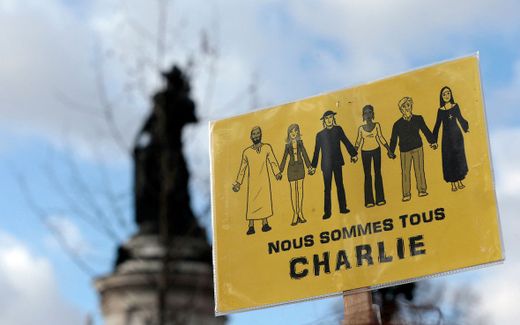Weekly column from France: Is secularism a threat or an opportunity for the Gospel?

This week's personal debate between the two candidates: Macron (left) and Le Pen (right). Photo AFP, Ludovic Marin
Christian Life
Between the first and second round of the presidential election, France is in turmoil. Of course, the polls give the advantage to the incumbent president Emmanuel Macron over Marine Le Pen. But it is such a small advantage that some people fear that the far right is on the doorstep of power.
The French society seems to be quite fractured between two ideological conceptions running through all European countries for the last decade: conservatism versus progressivism.

Marc Derœux (1965) is a French pastor, connected to the Baptist Federation (FEEBF).
At the moment, he serves as the director of the language school Center des Cèdres in Massy (near Paris).
Before, he served as a minister in Lille, Lyon and Valence. He is involved in the National Council of Evangelicals in France (CNEF).
Derœux is married to the schoolteacher Catherine, with whom he has three children.
How do Christians position themselves in this dilemma? We would indeed be surprised by the political choice of some of them, whatever their denomination. It must be said that the place of religion and the church was very present throughout the campaign for the first round of the presidential election, particularly in the arguments of Eric Zemmour, a candidate who was identified in the political sphere of the extreme right and came fourth with more than 7 per cent of the votes cast.
Atheists seem to be leading
Some statistics to start with:
Sixty-three per cent of French people do not identify themselves with any religion.
According to numerous studies, most French people consider themselves to be atheists.
A survey shows that one-third of French people describe themselves as “non-religious” and almost another third as “atheists”. The research was conducted in 2012 among 50,000 people in 57 countries by WIN / Gallup International, experts in religious matters.
However, having faith and practising one’s religion are two different things. According to the Gallup study, a significant proportion of the participants who stated that they belonged to a religion do not practice it.
According to the criteria established by the Gallup study, the tendency towards atheism is global. In the top 5 atheist countries (out of 50 countries surveyed), France ranks 4th behind China, Japan and the Czech Republic.
Diminishing religious consciousness
The greatest threat to the Christian faith is secularism… and secularisation within our churches. Let me explain...
Secularism, the fruit of secularisation, tends to remove religious consciousness not only from the public sphere but also from the private sphere.
Secularisation has been defined in various ways. In short, it can be viewed as the concept of a society not without God but without the Church. To be more precise, secularisation frees society from the guardianship of religions and, ultimately, from their authority structures and their churches as institutions.
Secularism is the “hard” version of secularisation; behind this label, we can identify the religion of the non-religious.

But secularism also provides an opportunity for Christians because it opens up a new space for spirituality.
We can observe that our contemporaries are searching for spirituality to express inner well-being. It is a search for God and meaning and purpose.
There is an appetite for exploring new spiritualities differing from the traditional paths of conventional and established religions, such as Christianity.
This is an opportunity
This might seem a disappointment for Christianity, but it is an opportunity.
Conservatism and Progressivism find their balance in reformism. Reformism is a central notion in Protestant thought. The famous “Ecclesia semper reformanda est” (The Church is always reforming) was popularised in 1947 by the theologian Karl Barth, who quotes Saint Augustine.
The current French president, Emmanuel Macron, is a disciple of the Protestant philosopher Paul Ricoeur. Paul Ricoeur worked, in particular, in the area of moral and political philosophy, drawing on Max Weber for an ethic of responsibility and an ethic of conviction. The example and the teaching of Jesus himself have certainly not been absent in the writings of these two thinkers.
We can perhaps understand why Macron rejects the old ‘left-right’ division, rather than aiming to bring political debate, and thus economic and social discussion, into progressivism in the face of conservatism. We might expect to find some echoes of the theorisation of social progress in Hegel.
There is more than conservative or progressive
However, between progressivism and conservatism, a pathway of responsibility emerges. This is a path in which our Protestant tradition has a legitimate place. Because of its freedom of conscience, the Protestant tradition lays a pathway of faith towards communities of authentic believers, leaving each person the responsibility to decide where they are for the truth about God.
There has been a shift away from secularisation to a concept that was dear to Karl Barth: the opposition of faith and religion and the desacralisation of religion; a desacralisation to increase holiness.
The history of the Protestant Church in France and elsewhere in the world, includes the need to balance progressivism and conservatism by choosing reformism, which involves accepting change without denying foundations.
Not only disciples but witnesses
Caricaturally, conservatism argues for a testimony based on doctrine and the strict observance of that doctrine for pure faith. Progressivism promotes an expression of faith that is engaged in society, open to the world and working with others to advance the Kingdom of God.
But this tension should be a tremendous catalyst to call those around us to follow Christ as believers and as disciples, not only as disciples but as witnesses.
The community of believers is a privileged place where we encourage one another to live out our faith with authenticity. The Protestant understanding of the Church emphasises the community dimension, rather than communitarianism, with its concept of the congregation.
Secularisation within the church
Too many Christians are drawn into the trend of secularisation in our Protestant churches themselves. In this sense, secularisation in our communities remains the greatest threat to the expansion of the Gospel.

We can face this challenge through education and training in our communities, leveraging knowledge, but know-how and especially know-being.
Looking in particular to the Apostle Paul’s writings in Ephesians 4:15, we see that love and truth are the two principles that we may use to guide us on the path of life, day after day, often walking on a narrow ridge, aiming to live an authentic life and a faith that communicates Life.
For this, we must be willing to adapt our language without changing, twisting, or compromising the message of the Gospel.
How can we speak about God to a society where the word ‘God’ has lost its meaning? This is the crucial question of Harvey Cox, an American theologian of the 20th century. In his book published in 1965, “The Secular City”, he tries to answer this question as best he can, arguing for a change of language, which leads to the secularisation of religious language. He said: “If we are to communicate God to a secular society, it will only be through the social and political action of those carrying and sharing the Gospel message.” It was the case for Martin Luther… King.
For God in Jesus has decided to make known his infallible Love through our fallible love and reveal the Truth about His Life through the relative truth of our lives...
Growth of church comes from testimony
We see in France that the growth of the last two decades is primarily the result of the personal testimony of authentic Christians. Christians who do not hide the truth about their weaknesses and mistakes but dare to manifest a genuine love for Jesus by showing him benevolent behaviour.
This is an essential issue that can help us in our choice of society, and therefore in the voting booth this Sunday!
Related Articles






